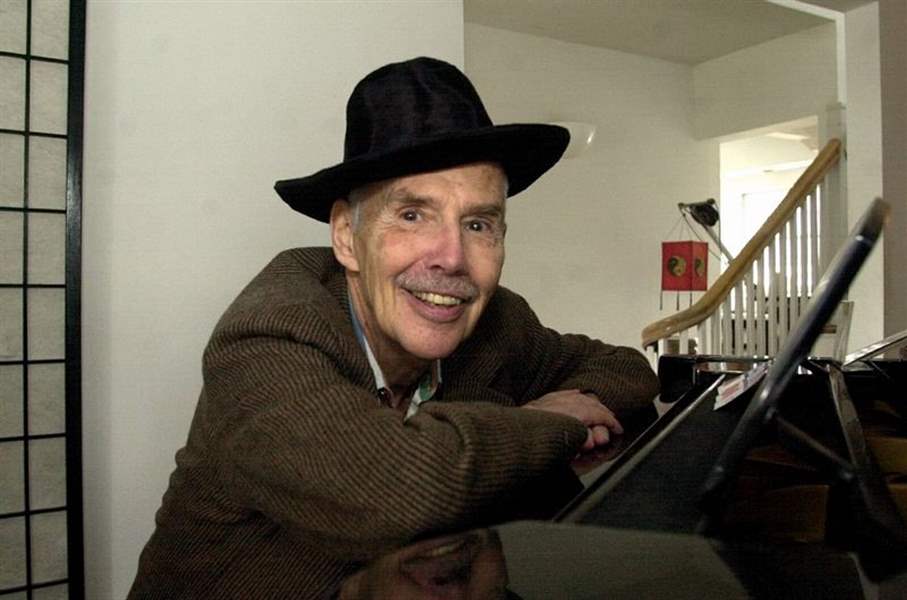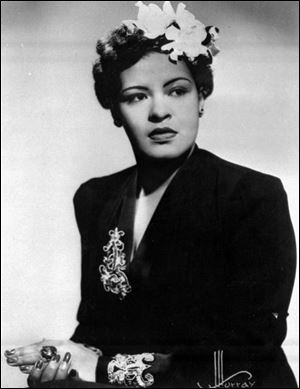
Biographer remembers Billie Holiday's greatness
3/31/2001
William Dufty co-wrote Lady Sings the Blues and wrote Sugar Blues, a book about the unhealthy effects of sugar.
“She said to me that I was the first white person who listened to her and laughed in all the right places.”
- William Dufty, co-author of Lady Sings the Blues.
BIRMINGHAM, Mich. - The memory of penning Billie Holiday's thoughts on a matchbox in some dark mid-century bar stays as fresh in William Dufty's mind as if it were yesterday.
Dufty and Holiday's friendship gave birth to the autobiography, Lady Sings the Blues, first published by Doubleday in 1956 - just three years before the singer's death at age 44.
“Mom and Pop were just a couple of kids when they got married. He was eighteen, she was sixteen, and I was three.”
Today, Dufty, 85, says he's busy working on another book about Holiday, whom he knew only six years. He was probably always destined to encounter her, he says.
“At long last, I'm going to do a book - and how does this title sound - Scenes from a Palship. That's what it was between us, a `palship,'” he said.

Billie Holiday
Holiday's presence still hovers over him - that voice and a tinkling piano somewhere in the background, now and again soaring into consciousness.
Lady Sings the Blues, the most haunting window into the jazz icon's life, ranks as one of Dufty's most important credits.
But if being the literary voice of Billie Holiday wasn't enough, Dufty also has written on nutrition. His Sugar Blues (Warner Books, 1976) reports on the health risks from eating sugar. Ironically, some modern references list Dufty as deceased.
Moreover, he was the sixth husband of silent film star Gloria Swanson, whom he says inspired Sugar Blues. Swanson died in 1983, but to this day, her widower often signs himself William VI.
Answering the door of his Detroit suburban home in bamboo sandals and thong socks, Dufty appears more the aging historian of ancient Asian cultures than documenter of a jazz legend.
A savory aroma - bean soup? - permeates the quiet home he shares with Dennis Fairchild, a Feng Shui practitioner, metaphysician, and celebrity astrologer.
The writer sits at the end of a black leather sofa, sips coffee - no sugar, of course - and journeys back some 50 years to recall the legendary Lady Day.
“At times it was very frustrating,” collaborating with Holiday on her memoir, he recalls.
“She wouldn't be in the mood and would get angry at something [he] said, and leave my apartment ... but as she stepped in the elevator, the remarks she said in anger to me would illumine a whole passage.”
Chapters read like a Greek tragedy, Harlem-style. Part fact, part embellishment, and all Holiday's reality.
Dufty dismisses the frequent categorization of Holiday as one more entertainer-turned-heroin addict, dropping names of prominent white entertainers and celebrities of the same era whose drug use was conveniently overlooked by law enforcement officials.
He is careful to pay homage to what Fairchild calls Dufty's “closest lady friend.”
“Billie was the funniest woman in the world,” said Dufty, peering down at the living room hardwood floors, as if spying her reflection there.
Born Eleanora Fagan, Holiday borrowed her professional name from screen star Billie Dove. She would first hear the music of Louis Armstrong and Bessie Smith on a Victrola at Alice Dean's, the Baltimore “house of ill repute” where she ran errands and scrubbed floors as a young girl.
She toured with Artie Shaw and Count Basie before going solo, and Benny Goodman took her to her first studio session. Between 1933 and 1944, she recorded some 200 “sides,” but never received royalties for any of them.
“She was triumphant; for 15 years the government had paraded her through a whirligig of courts, jail, bail, as a horrible example of something called a drug addict; in the end she turned the tables on them.
“She was proud; she had attained worldwide acclaim as the greatest jazz singer of all time, and that was that.”
That's what Dufty wrote in her New York Post obituary on Friday, July 17, 1959, leaving Holiday's death bed to compose it. Dufty and Holiday's special nurse were the only ones at her side when her heart sung its last tune.
Dufty nods approvingly.
Holiday's searing drawl fills the room:
Lady sings the blues
She tells her side
Nothing to hide
Now the world will know
Just what the blues is all about
The blues ain't nothing but a pain in your heart
when you get a bad start.
About their collaboration, Dufty recalls: “I understood, you see, that I couldn't use a tape machine [recorder].
“She would always reprimand you for not paying attention. You had to go along with her way of doing things,” he said. “That's just the way she was.”
In the '50s, Dufty was a welcomed fly on the wall in New York's black community - at least in Holiday's dressing room after a gig. He became known as “the guy who could write Negroes,” a title he accepted proudly.
But it wasn't flattery for “Negroes” that thrust Dufty into Holiday's life. Their pairing was simply happenstance - the sort of thing that can happen when a black woman with a presence commands her way into a curious white man's life.
Both had been raised Catholic. They weren't lovers, but Holiday always called Dufty “baby,” he says. He was nine months younger than she. Whenever the jazz vocalist ordered gin and 7-Up, Dufty requested a beer.
Maybe it was his unspoken loyalty that made her feel safe around him. The conclusion drawn from Dufty is that Holiday trusted him as much as she could understand the concept.
“I first met her through my first wife. [Holiday] was supposed to be the maid of honor at my wedding,” he said.
Dufty's first bride was Maely Daniele, a former Los Angeles publicist who cruised the Harlem nightspots where Holiday often sang. Oft-married and divorced, Daniele once wed child star actor Freddie Bartholomew, better known as “Little Lord Fauntleroy.”
Throughout the interview, Dufty shared memories of Holiday seeking refuge in his fifth-floor apartment he shared with Daniele on West 86th Street in New York City.
“Billie kept an inventory of safe houses,” he recalled. “She always had a key to our apartment. I had a grand piano and a private terrace where her dogs could [run].”
Holiday, Dufty said, hid from the police, press, and other demons haunting her world.
“I knew enough to keep my trap shut about anything she was doing in my place or anywhere. That was the prison we were all living in, in the 1950s,” Dufty said.
“Everybody smoked [pot], not just Billie, but she said if it wasn't for heroin, `I would be in jail right now for killing somebody,'” he said.
“All dope can do for you is kill you - and kill you the long, slow, hard way.”
“She lived in a police state, from her first arrest to the end, and unless you understood that and believed that, she wasn't comfortable with you,” Dufty said.
Dufty's speech is filled with slang of yesteryear, as if he were auditioning for a 1950s' television drama. He says “Hamp” for Lionel Hampton, “narc” for narcotics agent, and fills his conversation with recollections of sassy Holiday phrases like, “I'd rather be dead in New York than broke in Chicago.”
To Dufty's dismay, Lady Sings the Blues became a movie in 1972, starring Diana Ross in a portrayal of Holiday. “When you think of casting for someone like Billie Holiday, I think of a young Barbara Stanwyck, not Diana Ross,” said Dufty, hands outspread as if pleading to a producer.
Along with jazz critics, he was disappointed by what he considered over-fictionalizing of Holiday's life in the film, which also starred Richard Pryor and Billy Dee Williams.
It was in songs such as “Strange Fruit,” and her own “God Bless the Child,” that Holiday departed from popular material to depict the brutal reality of Southern lynchings and the alienation she had experienced during her youth.
Still, Dufty recalled, Holiday was not all tragedy.
“She had an air of total dignity, her wit was situational, not the Phyllis Diller-type humor. She was absolutely, defensively, herself,” Dufty said.
In the same breath, he recalls the jazz singer's temper.
“Out of nowhere, she smashed a bottle on the bar, and put it in the face of someone who had tried to cheat her - she didn't like people messing with her. She was contained, she didn't talk big to get a point across,” Dufty recalled.
Although her weight fluctuated, Dufty recalled the bronzed-skin singer as a“true Polynesian Princess” who captured audiences with her unique sound.
Holiday's love for both men and women often got her in trouble, Dufty recalls. “She was always involved in some triangle.”
Today, 42 years after her death, Billie Holiday remains a powerful force in music through books, videos, commemorative recordings, and the pending BBC documentary.
“She's bigger now than she ever was,” Dufty said. “You're nothing in this country `til you're dead.”
As he shows off a cherished photo by an Ebony magazine photographer, of the two of them working on the manuscript for Lady Sings the Blues, Dufty said he chooses to remember his friend as the free spirit she was.
“Like [late jazz pianist, 1921-1977] Erroll Garner once said, `she was like ice cream and cake.”